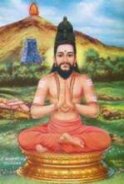

THE ESOTERIC
KANDAR ANUBHUTI
OR
THE SECRET TEACHING ON
GOD-EXPERIENCE
(A Treatise on Adwaitic Realization)
OF
SAINT ARUNAGIRINATHAR

 |  THE ESOTERIC KANDAR ANUBHUTI OR THE SECRET TEACHING ON GOD-EXPERIENCE (A Treatise on Adwaitic Realization) OF SAINT ARUNAGIRINATHAR |  |
 | by N.V. Karthikeyan |  |
| verses contents 20 21 22 23 24 25 26 27 28 29 .. 35 this verse in PDF version (4 parts) p-1 p-2 p-3 p-4 complete download of this book |
VERSE-25 மெய்யேஎன வெவ்வினை வாழ்வை உகந்து ஐயோ அடியேன் அலையத் தகுமோ கையோ அயிலோ கழலோ முழுதும் செய்யோய் மயிலேறிய சேவகனே.Meiye ena vevvinai vaazhvai ukanthu Aiyyo adiyen alayat thakumo Kaiyyo ayilo kazhalo muzhuthum, Seiyoy mayileriya sevakane. Taking life, of Karmas relentless, as real and rejoicing, Commentary The real power of the Karmas is seen in this verse. Though the seeker is fairly advanced, has the guidance of his Guru and is trying to abandon the notions of the reality of the phenomenal world and duties, the Karmas are so powerful that they make him take delight in those very things which he is trying to reject, as if they were very real! Verses 23, 24 and 25 depict the deplorable condition of the seeker when assailed by Avidya. In these situations, many seekers who do not have a proper Guru to guide them or are heedless, abandon their practices and take to normal life. But the undaunted ones, with the help of their Guru's grace, try to plod on and free themselves from the shackles of Karmas. The seeker is now in that condition. He intensely feels the need to free himself from the bonds of the relentless Karmas which have brought the present state of life, wherein out of necessity he has to take delight (as though it is real) in doing the daily round of duties, running here and there {(such as running about between home, office, market, doing other errands, etc. (அலைதல்)}, to fulfill the responsibilities to the family, which deprive him of his precious time and energy being concentrated on the (முழுதும் செய்யோய்) All-Perfect and All-Enchanting Lord. So he laments over his lot and appeals to the Lord: "Should I suffer like this?" In the process of meditation, the Sadhaka's effort is to transcend or forget the world. But when the inner purification goes on and the Vaasanas and Samskaras come up to the conscious level, they revive his memory of past experiences and thus, lend reality to the world or life that he tries to forget. This is another phase of the inner tussle of the Sadhaka, similar to the one of the last verse. Hence, his cry and resort to the All-Perfect Lord (முழுதும் செய்யோய்), which means a determined and resolute effort at more intense meditation on the Self. He has clear knowledge that the world of names and forms is unreal and has to be renounced by fixing his mind on the Self or Atman which is Satchidananda (Verse-17). And he has been initiated into the proper technique of meditation by his Guru (verse 20). Hence he is not to be easily led astray by these passing obstacles, which are due to the relentless working of the inexorable law of Karma. It is so powerful that it would seem as though it will overpower his Sadhana-power and Guru's grace. But, it cannot. It will soon exhaust itself and he will come out victorious. He knows that the remedy for all obstacles in meditation is meditation itself - more intense and prolonged. After all, positive will overcome the negative; divine grace will endure, while Karmas shall come to an end. Thus, with the confession to the Lord and invoking of His grace (verse 24), the Sadhaka even in the midst of this tempest of Vaasanas and Samskaras (Karmas) now forges forth into his meditation on the Self, or the Lord, as a mass of Perfection. The Lord's hands are red. They give protection to His devotees. The Lord's hands are "Abhaya-Karangal," that is, the hands that grant fearlessness to devotees and confer blessings on all. His hands have become red because of endless giving and giving. The Vel, which is Lord Skanda's principal divine weapon, is also red, because it pierced through the Asura Surapadman, and is tainted with his blood. His Feet are red due to the constant worship by the Devas and also by devotees. His hands give protection. His Vel grants wisdom. His Feet confer Moksha. Not only are the Lord's hands, Vel, and Feet red, but Lord Murugan Himself is red, in His whole being. Red is indicative of uprightness, greatness, beauty, etc., that is, Perfection. "O Lord, thou art Perfect! Release me from this imperfect world and show me a perfect way to Perfection," seems to be the prayer of the seeker. மெய்யேஎன வெவ்வினை வாழ்வை உகந்து -- 'Meiye yena Vevvinai vaazhvai ugandhu' -- "Taking this (phenomenal) life, of Karmas inexorable, as real and rejoicing in it.": Life on earth is imperfect. This phenomenal life is governed by the inexorable law of Karma, i.e., the law of cause and effect. Everything here is determined by this law. Things in the world change, the bodies come into being and perish, and people are brought together and separated - all due to the working of this law. In spite of knowing this, we take these passing things as real and try to find happiness in them. The result is suffering. Why do we do so? This again is due the working of this relentless Law of Karma. It would be interesting to know what this Law of Karma is and how it works. It is the Law of Cause and Effect. It is one of the laws of Nature, like the Law of Gravitation, Law of Cohesion, etc. These laws are not man-made nor do they belong to any religion. They are cosmic laws, of Nature, made by God or the Cosmic Being from the beginning of creation, and so they operate equally on all, whether we accept them or not, believe in them or not, want them or not. The universe or the cosmos or Nature is a balance of forces, which always maintains it. If anything/anyone disturbs its balance, it tries to restore it, and in so doing it redounds upon the one who disturbs it, like a rubber ball thrown against a wall that comes back to the thrower. It is this reaction from the cosmos in its effort to come back to its harmony that is the working of the law of Karma. Every individual is an ego-center, as it were, that disturbs the cosmic balance by its actions and thoughts which are mostly desire-prompted and selfish. So our actions (including our thoughts) produce a reaction from the cosmos, according to their intensity and motive. "As you sow, so do you reap." Good results follow good actions and bad from bad. This law of Karma is referred to as unrelenting; it has no friends or enemies, and it is very scientific in its working - not even a single Karma, however small it may be, can go unrewarded. There is no such thing as striking a balance. If one does, say, 10 good karmas and 8 bad, the latter 8 cannot be cancelled with 8 of the former and only the balance of 2 good enjoyed. No. All the 10 good and all the 8 bad have to be individually rewarded according to each one's intensity. Hence, it is called inexorable. This is the reason why we come across good people suffering, though they might not have done any wrong in this life, which suffering is due to their past wrongs. It is also not uncommon to see evil-doers enjoying in this life, for similar reasons. Indeed, the law of Karma is terrible and mysterious. But it equally assures one's future good for the good deeds done now and vice-versa. Every action of ours produces a reaction. The actions that we perform are called Karmas; the reactions or the fruits that follow from them (Karma-phala) are also called Karmas. We have taken this body as a result of our past Karmas which also continue to govern our life now. Again, the actions that we perform now produce reactions and lead to further births. Thus, Karmas are both the cause and effect of our life, and we are totally governed by the law. This seems to be an endless process. Naturally, the question arises as to how to get freed from this. Is there no way out? Yes, there is. The solution is to resort to the Perfect Being - to God, who is All-Perfect. We are subject to the law of Karma because we regard ourselves as the doers of actions and with expectation of their fruits. But if we take refuge in God, in whom the law does not operate, we will be freed from that law. This body has been given to us as a result of our past actions. Our (pleasant and painful) experiences in this span of life are already determined by the effects of our past actions that have caused this life. Hence, all our experiences will pass away and come to an end one day, when the force of the momentum that caused them ceases. Therefore, undue importance is not to be attached to this earthly life. Neither are we to be overjoyed when desirable experiences come, nor are we to be depressed and sunken when undesirable ones present themselves, as both will pass away. Life is transitory (verse-27). Such a life should not be taken as real, as the all. God is the great Reality, the all-perfect, "red" in His entire being. He is to be sought always, whatever be one's condition. Otherwise, one is easily tossed about by every little happening in life, like a dry leaf that is thrown hither and thither by the wind. But he who has resorted to God remains unaffected like a mountain, which is not shaken a bit even by the strongest wind. One who holds fast to God, that is, whose mind is fixed on God, is not easily shaken by the passing events in life. He knows that these experiences come and go, but do not touch his inner, real personality. But the man of the world, for whom the things of world are the only reality, to whom nothing higher exists, is easily carried away by every little incident in life. If his bank balance fails, he collapses. If his dear ones depart, his life becomes sapless. These come as shocking incidents that break his weak heart. But he who is devoted to God knows that the things of the world are subject to change and that they will leave him any moment, and so he is not affected by them. Only he who takes them as permanent realities gets a rude shock when they are separated from him, which is bound to happen because of the working of the law. Persons and things are brought together and separated by their Karmas, as logs of wood in a river are joined or separated by wind. The law of Karma is no respecter of our joys and sorrows. It works relentlessly. Hence, knowing the transitory nature of things of this phenomenal life, one should take refuge in that which is "red," i.e., perfect and permanent (God), so that one may not be tossed about by the passing events of this illusory life. Thus the seeker, though he is tormented by his deplorable condition due to the working of Karmas, resorts to the All-Perfect Lord and continues his meditation on the Self. Our life is governed by the relentless law of Karma which is merciless. But the law-giver (the Lord) is full of mercy. So long as one does not take refuge in the Lord, the law of Karma works inexorably. Once, we surrender ourselves to God, the law loses its hold on us. As long as we take this world as real and ourselves as the doers of deeds and act with the expectation of their fruits, we cannot escape the working of the law. The idea of agency or doership and enjoyership is what makes us subject to the working of the law and is the cause of our bondage. But those who take refuge in the Lord and act as His instruments, for His pleasure, in the participation of His will, without expectation of rewards, as worship of the Lord, as offerings unto Him go beyond the working of this hard law. Hence, resort to the merciful Lord is the only way to be freed from the merciless law of Karma. The law can be overcome only by surrender to the Law-Giver; the Lord's Maya is transcended only by His grace, as Bhagavan Sri Krishna says: "Verily, this divine illusion of Mine (Maya), made up of the (three) qualities (of Nature), is difficult to cross over; those who take refuge in Me alone cross over this illusion." (Gita VII-14). The child gets rest in the play of 'hide and seek', only when it returns to the granny who initiated and keeps the play going. "O Lord, thou art the Perfect One. How long should I be mercilessly kicked about by this inexorable Karmas? How long will I rejoice in this world, taking it as real? Grant me proper understanding (Viveka). Grant me love for thy Feet. Save me, O Perfect One, O peacock-rider, O glorious One, O valorous One! How can thou be called Perfect, when I, thy slave, am tormented by this illusory life? Does my suffering befit Thine all-perfectness? No. Hence, save me," is the seeker's appeal to the Lord. |
| contents 20 21 22 23 24 25 26 27 28 29 .. 35 this verse in PDF version (4 parts) p-1 p-2 p-3 p-4 |
| ... www.kaumaram.com ... The website for Lord Murugan and His Devotees முகப்பு கௌமாரம் அட்டவணை மேலே தேடல் home Kaumaram contents top search |
If you do not see Tamil characters or for 'offline' viewing, please install 'SaiIndira' fonts from Azhagi.com download Free Azhagi software |
Kaumaram.com is a non-commercial website. This website is a dedication of Love for Lord Murugan. Please take note that Kaumaram.com DOES NOT solicit any funding, DIRECTLY or INDIRECTLY. [xhtml] .[css] |